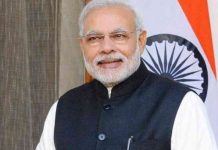
Owaisi’s party AIMIM is believed to have created a situation which led to the victory of the BJP in most of the165 constituencies where the victory margin ranged between 200 and 2000 votes. This indicates the parties opposed to BJP can ignore Owaisi at their own peril
The just concluded UP Assembly elections have once again highlighted the fact that the style of functioning of well-known Hyderabad-based politician, Barrister Asaduddin Owaisi, head of the All-India Majlis Ittehadul Muslimeen (AIMIM), causes communal polarisation and the
major beneficiary of such a development is the BJP. That is why Owaisi’s party is accused of having created a situation which led to the triumph of the BJP in most of the165 constituencies where the victory margin ranged between 200 and 2000 votes.
It is not without reason that the Owaisi factor today dominates most private discussions among Muslims. This factor alone, it is argued, impacted the UP elections so much so that the entire battle of the ballot went against the Opposition though the BJP was hardly in a
position to retain power in the country’s politically most significant state.
It is generally believed that the Akhilesh-Yadav-led Samajwadi Party (SP) would have easily captured power in UP, upsetting the BJP’s applecart, had there been no Owaisi factor in the polls, being treated as the predictor of the 2024 Lok Sabha election results. The denouement has forced many people to describe the AIMIM as the ‘B’ team of the BJP. That the BSP and the Congress also indirectly helped the BJP by causing a division of Muslim votes
by fielding their nominees in almost all the constituencies where the minority voters were in a sizable number, does not figure much in the discussions.
The BJP emerged victorious in seven constituencies with a margin of merely 200 votes, in 23 constituencies with 500 votes, in the case of 49 seats with 1000 votes and in 86 constituencies with 2000 votes. In these 165 constituencies, the BJP succeeded by trying to influence
voters to forget their caste identities. Owaisi’s campaigners spent their energies on highlighting the community factor, which indirectly forced different castes to shift their loyalties to the BJP from the SP and the BSP, thriving on playing identity politics.
In the process of projecting himself as the messiah of Muslims, instead of all the marginalised sections of society, Owaisi contributed a lot to communal polarisation, providing his detractors an opportunity to accuse him of facilitating the victory of the BJP. But his supporters are hardly bothered about it. They proudly declare that at least there is one leader who can call a spade a spade and fearlessly raise questions concerning the plight of the minority community. All the nominees of the AIMIM barring one lost their
security deposit, but Owaisi supporters do not feel ashamed of it.
“It’s all in the game. Our candidates will win tomorrow if not today. We have to wait and watch”, so goes their argument. In the November 2020 assembly elections in Bihar, too, the Owaisi factor was blamed for frustrating the attempts of the Tejaswi Yadav-led RJD to capture power from Chief Minister Nitish Kumar. After two unsuccessful attempts in the past Owaisi’s AIMIM succeeded in winning five seats in Bihar’s Seemanchal region, having a sizable Muslim presence. Owaisi’s gain was considered the RJD-Congress combine’s loss, the principal constituents of the Mahagathbandhan or the Grand Alliance.
The AIMIM was not favoured for an alliance both in UP and Bihar by the principal contenders for power for different reasons. In the case of the Bihar 2020 poll, the AIMIM could not be part of the Mahagathbandhan because its demand for seats was unacceptable to RJD and Congress leaders. In UP, the SP virtually treated the AIMIM as an untouchable for fear of communal polarisation, which would go against the Akhilesh Yadav-led party. That is, perhaps, one reason why he declared on December 1, 2021, “Only a few smaller parties remain with whom we are in touch (for an alliance). We will not ally with the AIMIM.”
This, however, does not mean that no political party formed an alliance with the AIMIM. Owaisi announced on January 22, 2022, that his party had forged an electoral tie-up with Babu Singh Kushwaha and the Bharat Mukti Morcha for contesting the elections in UP. The AIMIM had also finalised an electoral arrangement with the Suheldev Bharatiya Samaj Party of Om Prakash Rajbhar, but the latter ended this and jumped onto the SP bandwagon.
“If our alliance comes to power there will be two Chief Ministers, one from an OBC community and another from the Dalits. In that situation, there will be three Deputy CMs, including one from the Muslim community,” Owaisi had declared after finalising the alliance with Kushwaha and the Bharat Mukti Morcha. That AIMIM candidates performed very poorly in the polls is another story.
The defeat of the SP in the UP assembly elections and Tejaswi Yadav’s RJD in the 2020 Bihar polls, believed to be mainly because of the Owaisi factor, has made one thing clear. Whether one likes it or not, the Owaisi factor cannot be ignored in any election involving a
substantial number of Muslim voters. Chances are that accommodating Owaisi’s AIMIM in a non-BJP alliance will be more profitable than leaving him alone.
There is, however, one major problem with the AIMIM supremo. Owaisi raises issues without realising the larger implications of what he says. His speeches are prone to causing communal polarisation when the BJP can be the obvious gainer.
So, there are major risks involved in both situations — ignoring the AIMIM or entering into a political arrangement with Owaisi’s party. The BJP is bound to be the biggest beneficiary because of the Owaisi factor in all circumstances unless, of course, the AIMIM itself wins
the battle. How to handle this factor remains a major challenge in an electoral contest particularly for an organisation expecting Muslim voters’ support to defeat the BJP.
Owaisi justifies his brand of politics by arguing, as he did in the case of UP, that different castes like Jatavs, Yadavs, Rajbhars and Nishads have their own political leadership though they constitute a relatively smaller part of the population. However, it is a pity that
the Muslims in UP, despite being more than 19 per cent of the state’s population, do not have leaders from within the community to fight for their causes. He also wants to end the use of Muslims as a vote bank by the Congress, the SP, the BSP, the RJD (in the case of Bihar) and
other such parties.
Preventing the use of Muslims as a vote bank is fine. But promoting community-based politics cannot be described as a healthy idea. This will be divisive politics and may lead to highly dangerous consequences. Divisive politics on any pretext and indulged in by any
organisation must be resisted in the larger interest of the nation.
(The writer, a Delhi-based political commentator, is a former Deputy Editor of The Tribune, Chandigarh)













